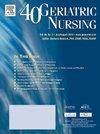Factors influencing proactive health behaviors in pre-frailty older adults: A qualitative study based on theory of planned behavior
IF 2.5
3区 医学
Q3 GERIATRICS & GERONTOLOGY
引用次数: 0
Abstract
Aims
to explore factors that can influence proactive health behaviors in pre-frailty older adults.
Design
this is a qualitative content analysis study.
Methods
data collected through interviews with 20 pre-frailty older adults in a geriatric unit at a general hospital in Guangzhou, China. We used deductive content analysis to categorize codes and calculate their frequency based on the theory of planned behavior. Inductive content analysis was used to analyze data that could not be analyzed according to the theory of planned behavior.
Results
the data were analyzed and grouped into categories by beliefs similarity, counted from the frequencies. The factors of 6 behavioral beliefs, 6 normative beliefs, and 14 control beliefs were issued. Six themes emerged, including positive attitudes toward proactive health behaviors outcomes, lack of proactive health awareness the negative influence of children on proactive health behaviors, lack of knowledge of proactive health behaviors, spouses play an important role in proactive health behaviors, low resistance to unhealthy behavior.
Conclusion
this research will support to the construction of a psychometric scale to measure the intentions of proactive health behaviors in pre-frailty older adults. These influencing factors will also help us to develop measures to improve the ability of pre-frailty older adults to be proactive health in the future.
Impact
this research validates and extends the theory of planned behavior. The findings of factors influencing proactive health behaviors help us to develop strategies to enhance proactive health in pre-frailty older adults in the future. These findings also provide content for the construction of the psychometrics of proactive health intentions scales.
Reporting Method
this study follows the COREQ reporting norms.
影响虚弱前老年人主动健康行为的因素:基于计划行为理论的定性研究。
设计:这是一项定性内容分析研究。方法:我们在中国广州一家综合医院的老年病科对 20 名身体虚弱的老年人进行了访谈,并收集了相关数据。我们采用演绎式内容分析法对代码进行分类,并根据计划行为理论计算其频率。结果:对数据进行了分析,并按信念相似性进行了分类,计算了频率。发布了 6 个行为信念、6 个规范信念和 14 个控制信念因子。出现了 6 个主题,包括对主动健康行为结果的积极态度、缺乏主动健康意识、子女对主动健康行为的负面影响、缺乏主动健康行为知识、配偶在主动健康行为中扮演重要角色、对不健康行为的抵制力低。影响:本研究验证并扩展了计划行为理论。影响:本研究验证并扩展了计划行为理论。关于影响主动健康行为的因素的研究结果有助于我们制定策略,以提高体弱前老年人未来的主动健康水平。这些发现还为主动健康意向量表的心理测量学构建提供了内容。报告方法:本研究遵循 COREQ 报告规范。
本文章由计算机程序翻译,如有差异,请以英文原文为准。
求助全文
约1分钟内获得全文
求助全文
来源期刊

Geriatric Nursing
医学-护理
CiteScore
3.80
自引率
7.40%
发文量
257
审稿时长
>12 weeks
期刊介绍:
Geriatric Nursing is a comprehensive source for clinical information and management advice relating to the care of older adults. The journal''s peer-reviewed articles report the latest developments in the management of acute and chronic disorders and provide practical advice on care of older adults across the long term continuum. Geriatric Nursing addresses current issues related to drugs, advance directives, staff development and management, legal issues, client and caregiver education, infection control, and other topics. The journal is written specifically for nurses and nurse practitioners who work with older adults in any care setting.
 求助内容:
求助内容: 应助结果提醒方式:
应助结果提醒方式:


